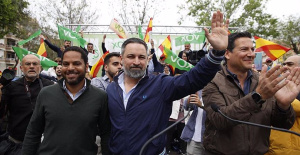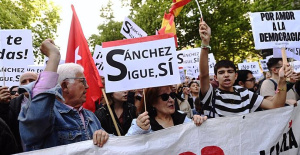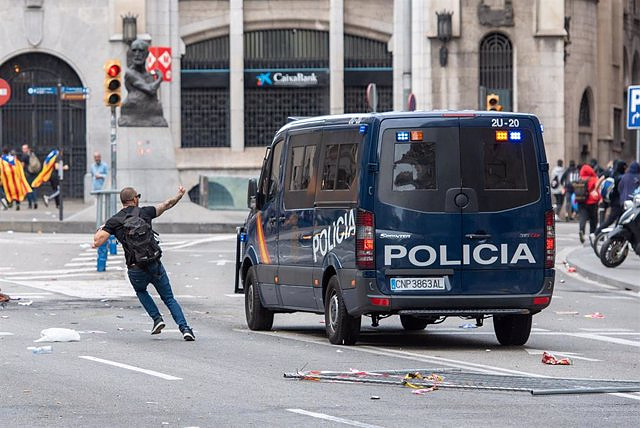They remind Yolanda Díaz that the agents did not commit any crime in Catalonia and make it ugly that they are used as a "parapet" in partisan debates
MADRID, 28 Ago. (EUROPA PRESS) -
Several representative organizations of the National Police and the Civil Guard have rejected the possibility of approving an amnesty law that "matches" the work they carried out to stop the independence referendum of 1-O in Catalonia, complying with court orders and those convicted or charged for their involvement in the 'procés'.
"It is indecent that the Government of Spain proposes to equate the actions of the National Police with that of the criminals who participated in an attempted coup in Catalonia", JUPOL pointed out.
From the SUP they criticize the fact that those who broke the law and public servants are "put on the same plane" and the CEP has denounced the use of the State Security Forces and Bodies as a "parapet to justify an amnesty for pro-independence politicians convicted of sedition or other crimes". "We ask Yolanda Díaz and the rest of the parties not to use us in partisan debates," they have claimed.
The police unions react in this way to the words of the Vice President of the Government and acting Minister of Labor, Yolanda Díaz, who this Monday defended a future amnesty law, understanding that it is "absolutely constitutional." The leader of Sumar has added that there are "multiplicity of assumptions" for the possible beneficiaries, citing the "people who have placed ballot boxes" and the prosecuted authority agents.
"There are multiple assumptions, there are people who have placed ballot boxes; there are agents of the authority who are also prosecuted for different behaviors. In short, this is the complexity of this norm, but I maintain, like many other legal scholars, that it is absolutely constitutional," Yolanda Díaz said in an interview on RTVE's La 1, collected by Europa Press.
"The police officers who acted on 1-O in Catalonia did so at all times in accordance with current legislation, complying with orders from the Government of Spain and a mandate from the Justice, so they would not need amnesty of any kind, since that they should not be immersed in or any judicial process for carrying out their work, putting compliance with the Law and their duty before their physical integrity", has defended Aarón Rivero, general secretary of JUPOL, in statements to Europa Press.
SUP sources have defended that for the police officers prosecuted for 1-O what they are demanding is their free acquittal. "It is not at all acceptable that they place us on the same level as those who broke the law," they lamented.
The general secretary of the CEP, Víctor M. Vigil, recalled that the police have not committed in Catalonia "not a single crime, much less of a political nature" for which they have to be included in a possible amnesty law.
"If what they want is to seek a guarantee for these negotiations, we already anticipate that ours will not have it because there is no more harmful policy for police work than that which denatures the principle of legality of a Rule of Law", has warned the CEP, which flatly rejects "any measure that encourages impunity for any criminal".
The CEP has shown its concern that the "presence, facilities or powers of the National Police and Civil Guard could be a bargaining chip in political negotiations."
From the Civil Guard, the AUGC spokesman, Pedro Carmona, has also regretted that the amnesty "threatens to undo all the hard work carried out by the State Security Forces and Bodies in such a complicated situation, in one of the greatest challenges to the State".
"Deep disappointment and demotivation have taken root among the civil guards due to the lack of institutional support from the Government of Pedro Sánchez. We feel that we are being used as a bargaining chip in Catalonia", he added, underlining his work against the pro-independence leaders who wanted to "undermine the social order and restrict the rights of citizens".

 Exploring Cardano: Inner Workings and Advantages of this Cryptocurrency
Exploring Cardano: Inner Workings and Advantages of this Cryptocurrency Seville.- Economy.- Innova.- STSA inaugurates its new painting and sealing hangar in San Pablo, for 18 million
Seville.- Economy.- Innova.- STSA inaugurates its new painting and sealing hangar in San Pablo, for 18 million Innova.- More than 300 volunteers join the Andalucía Compromiso Digital network in one month to facilitate access to ICT
Innova.- More than 300 volunteers join the Andalucía Compromiso Digital network in one month to facilitate access to ICT Innova.-AMP.- Ayesa acquires 51% of Sadiel, which will create new technological engineering products and expand markets
Innova.-AMP.- Ayesa acquires 51% of Sadiel, which will create new technological engineering products and expand markets Unicaja lifts its first FIBA Champions League at the expense of Lenovo Tenerife
Unicaja lifts its first FIBA Champions League at the expense of Lenovo Tenerife Abascal (Vox) criticizes that Sánchez is "victimizing" himself and calls for elections after his possible resignation
Abascal (Vox) criticizes that Sánchez is "victimizing" himself and calls for elections after his possible resignation Carlos Alcaraz reaches the round of 16 in Madrid without breaking a sweat
Carlos Alcaraz reaches the round of 16 in Madrid without breaking a sweat Some 5,000 people demonstrate in front of Congress for democracy, hours before Sánchez's decision
Some 5,000 people demonstrate in front of Congress for democracy, hours before Sánchez's decision How Blockchain in being used to shape the future
How Blockchain in being used to shape the future Not just BTC and ETH: Here Are Some More Interesting Coins Worth Focusing on
Not just BTC and ETH: Here Are Some More Interesting Coins Worth Focusing on UPV students build a prototype of a wooden house to move to Equatorial Guinea
UPV students build a prototype of a wooden house to move to Equatorial Guinea The UA opens the call for the Impulso 2024 Awards for the best innovative business initiatives
The UA opens the call for the Impulso 2024 Awards for the best innovative business initiatives ALI, virtual assistant from Alicante, internationally recognized by the OECD
ALI, virtual assistant from Alicante, internationally recognized by the OECD Retrópolis brings the golden age of video games and computing to the UPV
Retrópolis brings the golden age of video games and computing to the UPV A million people demonstrate in France against Macron's pension reform
A million people demonstrate in France against Macron's pension reform Russia launches several missiles against "critical infrastructure" in the city of Zaporizhia
Russia launches several missiles against "critical infrastructure" in the city of Zaporizhia A "procession" remembers the dead of the Calabria shipwreck as bodies continue to wash up on the shore
A "procession" remembers the dead of the Calabria shipwreck as bodies continue to wash up on the shore Prison sentences handed down for three prominent Hong Kong pro-democracy activists
Prison sentences handed down for three prominent Hong Kong pro-democracy activists ETH continues to leave trading platforms, Ethereum balance on exchanges lowest in 3 years
ETH continues to leave trading platforms, Ethereum balance on exchanges lowest in 3 years Investors invest $450 million in Consensys, Ethereum incubator now valued at $7 billion
Investors invest $450 million in Consensys, Ethereum incubator now valued at $7 billion Alchemy Integrates Ethereum L2 Product Starknet to Enhance Web3 Scalability at a Price 100x Lower Than L1 Fees
Alchemy Integrates Ethereum L2 Product Starknet to Enhance Web3 Scalability at a Price 100x Lower Than L1 Fees Mining Report: Bitcoin's Electricity Consumption Declines by 25% in Q1 2022
Mining Report: Bitcoin's Electricity Consumption Declines by 25% in Q1 2022 Oil-to-Bitcoin Mining Firm Crusoe Energy Systems Raised $505 Million
Oil-to-Bitcoin Mining Firm Crusoe Energy Systems Raised $505 Million Microbt reveals the latest Bitcoin mining rigs -- Machines produce up to 126 TH/s with custom 5nm chip design
Microbt reveals the latest Bitcoin mining rigs -- Machines produce up to 126 TH/s with custom 5nm chip design Bitcoin's Mining Difficulty Hits a Lifetime High, With More Than 90% of BTC Supply Issued
Bitcoin's Mining Difficulty Hits a Lifetime High, With More Than 90% of BTC Supply Issued The Biggest Movers are Near, EOS, and RUNE during Friday's Selloff
The Biggest Movers are Near, EOS, and RUNE during Friday's Selloff Global Markets Spooked by a Hawkish Fed and Covid, Stocks and Crypto Gain After Musk Buys Twitter
Global Markets Spooked by a Hawkish Fed and Covid, Stocks and Crypto Gain After Musk Buys Twitter Bitso to offset carbon emissions from the Trading Platform's ERC20, ETH, and BTC Transactions
Bitso to offset carbon emissions from the Trading Platform's ERC20, ETH, and BTC Transactions Draftkings Announces 2022 College Hoops NFT Selection for March Madness
Draftkings Announces 2022 College Hoops NFT Selection for March Madness























